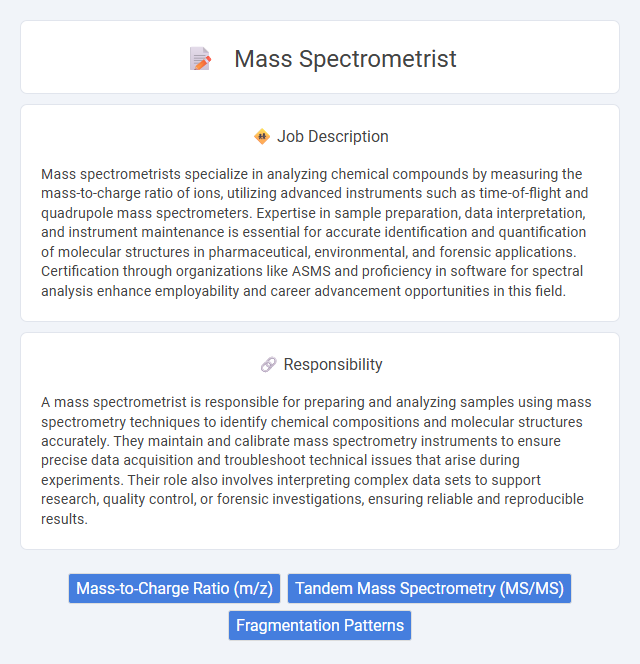
Mass spectrometrists specialize in analyzing chemical compounds by measuring the mass-to-charge ratio of ions, utilizing advanced instruments such as time-of-flight and quadrupole mass spectrometers. Expertise in sample preparation, data interpretation, and instrument maintenance is essential for accurate identification and quantification of molecular structures in pharmaceutical, environmental, and forensic applications. Certification through organizations like ASMS and proficiency in software for spectral analysis enhance employability and career advancement opportunities in this field.
Mass spectrometry work may be more suitable for individuals with strong attention to detail and an interest in analytical chemistry, as the job often involves operating complex instruments and interpreting precise data. People who prefer repetitive or highly physical tasks might find this role less fitting due to the technical and cognitive demands. Those with patience and good problem-solving skills will likely have a higher probability of success and satisfaction in this career.
Qualification
A mass spectrometrist typically requires a bachelor's or master's degree in chemistry, biochemistry, or a related scientific field, with specialized training in mass spectrometry techniques. Proficiency in operating mass spectrometers, data analysis software, and sample preparation is essential for accurate molecular identification and quantification. Advanced roles may demand experience in research, method development, and knowledge of regulatory standards governing laboratory practices.
Responsibility
A mass spectrometrist is responsible for preparing and analyzing samples using mass spectrometry techniques to identify chemical compositions and molecular structures accurately. They maintain and calibrate mass spectrometry instruments to ensure precise data acquisition and troubleshoot technical issues that arise during experiments. Their role also involves interpreting complex data sets to support research, quality control, or forensic investigations, ensuring reliable and reproducible results.
Benefit
Mass spectrometrists likely experience benefits such as access to cutting-edge technology and opportunities for specialized skills development. Their expertise may be in demand across various industries, potentially leading to competitive salaries and job stability. Working in this field probably offers chances for collaboration on innovative research and scientific advancements.
Challenge
Mass spectrometrists likely encounter complex challenges in interpreting intricate data patterns from diverse sample types, requiring advanced analytical skills. The role may demand continuous adaptation to evolving technologies and methodologies to maintain precision and accuracy. Problem-solving under tight deadlines is probably a frequent aspect of their professional environment.
Career Advancement
Mass spectrometrists with advanced expertise in analytical techniques and instrumentation often progress to senior research scientist or laboratory manager roles within pharmaceutical, environmental, or biotech industries. Mastery of data interpretation and method development enhances opportunities for leadership positions and specialized consulting roles in proteomics, metabolomics, or forensic analysis. Continuous professional development in software tools like Xcalibur and proficiency in tandem MS/MS systems significantly boost career growth potential.
Key Terms
Mass-to-Charge Ratio (m/z)
A Mass Spectrometrist specializes in analyzing the Mass-to-Charge Ratio (m/z) of ions to identify molecular structures and quantify chemical compounds. Precise measurement of m/z values is critical for interpreting complex spectra and determining the molecular weight of analytes. Expertise in calibrating instruments and optimizing ionization techniques enhances accuracy and sensitivity in mass spectrometry data.
Tandem Mass Spectrometry (MS/MS)
Mass spectrometrists specializing in Tandem Mass Spectrometry (MS/MS) analyze complex biological and chemical samples by fragmenting ions to obtain detailed structural information, crucial for proteomics, metabolomics, and pharmaceutical research. They operate advanced MS/MS instruments such as triple quadrupole and ion trap mass spectrometers, optimizing methods for enhanced sensitivity and specificity. Expertise in data interpretation using software like Skyline or Mascot supports identification and quantification of molecules, advancing biomarker discovery and drug development.
Fragmentation Patterns
Mass spectrometrists analyze fragmentation patterns to identify molecular structures and determine compound compositions with precision. Expertise in interpreting these patterns enables accurate detection of unknown substances and enhances the reliability of qualitative and quantitative analyses. Mastery of fragmentation data directly contributes to advancements in proteomics, metabolomics, and pharmaceutical research.
 kuljobs.com
kuljobs.com